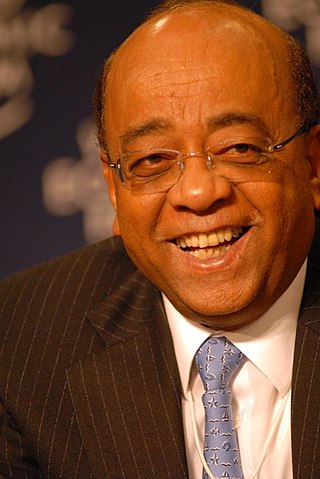Telecommunications in Burkina Faso include radio, television, fixed and mobile telephones, and the Internet.
Telecommunications in Saudi Arabia have evolved early in the Kingdom since the establishment the Directorate of Post, Telephone and Telegraph (PTT) in 1926.

SK Telecom Co., Ltd. is a South Korean wireless telecommunications operator and former film distributor and is part of the SK Group, one of the country's largest chaebols. It leads the local market with 50.5 percent share as of 2008. SK Telecom is the largest wireless carrier in South Korea, with 27.019 million subscribers as of Q4 2017.
Emirates Telecommunications Group Company PJSC, doing business as etisalat by e& is an Emirati-based multinational telecommunications services provider, currently operating in 16 countries across Asia, the Middle East and Africa. It is the 18th largest mobile network operator in the world by number of subscribers. In December 2020, etisalat claimed to provide the world’s fastest 5G download speed at 9.1 Gigabits per second, a network which it has started rolling out in Dubai since 2017. Etisalat is one of the strongest brand in the Middle East and Africa, and one of the strongest telecoms brand in the world.
Celtel was a telecommunications company that operated in several African countries. It was founded by Sudanese-born Mo Ibrahim.

Mobitel was a Slovenian GSM/UMTS/LTE mobile operator. The company merged with Telekom Slovenije in 2013.
Zain Jordan is part of the Zain Group currently serving over 32 million active customers across the Middle East and Africa. Effective September 8, 2007, Zain is the new corporate master brand name for the Group, the leading mobile telecommunications provider in the Middle East and Africa. The Group now operates under the Zain brand in Jordan, Kuwait, Bahrain and Sudan. In Iraq, it is currently known as mtc-atheer; in Lebanon, as mtc-touch; and in 14 sub-Saharan countries in Africa as Celtel: Burkina Faso, Chad, Democratic Republic of the Congo, Republic of the Congo, Gabon, Kenya, Malawi, Madagascar, Niger, Nigeria, Sierra Leone, Tanzania, Uganda and Zambia.

Umniah is a Jordanian mobile network operator. A subsidiary of Bahrain-based Batelco, it is the third and most recent GSM cellular phone company to enter the Jordanian telecom market. As of 2014 Umniah has a 30 percent share of the mobile telecommunications market.

Sri Lanka Telecom PLC, doing business as SLT-MOBITEL, is the national telecommunications services provider in Sri Lanka and one of the country's largest companies with an annual turnover in excess of Rs 40 billion. The company provides domestic and corporate services which include fixed and wireless telephony, Internet access and IT services to domestic, public and business sector customers. As of 2018 SLT-MOBITEL was Sri Lanka's second largest mobile network operator with over 7.9 million subscribers.

Sir Mohammed Fathi Ahmed Ibrahim is a Sudanese-British billionaire businessman. He worked for several telecommunications companies, before founding Celtel, which when sold had over 24 million mobile phone subscribers in 14 African countries. After selling Celtel in 2005 for $3.4 billion, he set up the Mo Ibrahim Foundation to encourage better governance in Africa, as well as creating the Ibrahim Index of African Governance, to evaluate nations' performance. He is also a member of the Africa regional advisory board of London Business School.
Mobile Telecommunications Company K.S.C.P., is a Kuwaiti mobile telecommunications company founded in 1983 in Kuwait as MTC, and later rebranded as Zain in 2007. Zain has a commercial presence in seven countries across the Middle East with 49.5 million active customers as of 31 December 2019. The Vice Chairman and Group CEO is Bader Nasser Al-Kharafi, who was appointed in March 2017. Approximately 24.6% of the company is owned by Kuwait Investment Authority; 21.9% is owned by Omantel; only shareholders that own above 5% are disclosed.

Vodacom Tanzania Limited is Tanzania's leading cellular network company. As of December 2020, Vodacom Tanzania had over 15.6 million customers and was the largest wireless telecommunications network in Tanzania. Vodacom Tanzania is the second telecom company in Africa, after Vodacom, to switch on its 3G High-Speed Downlink Packet Access (HSDPA) which was available only in Dar Es Salaam in early 2007.

Airtel Tanzania Limited is the third-largest mobile network operator in Tanzania operated by Airtel Africa, which is a subsidiary of Bharti Airtel of India, behind Vodacom Tanzania and Tigo Tanzania. As of September 2017, Airtel Tanzania had 10.6 million voice subscribers. As of December 2017 according to data provided by the Tanzania Communications Regulatory Authority, Airtel Tanzania controlled 27.1 percent of Tanzania's mobile telephone market by customer numbers, at that time estimated at 10.86 million.

Tanzania Telecommunications Corporation, formerly Tanzania Telecommunications Company Limited (TTCL), is the oldest and largest fixed line telecommunications company in Tanzania. The company comes forth from the former Tanzania Posts and Telecommunications Corporation in 1993. TTCL was wholly owned by the Government of Tanzania until the partial privatisation of the company on 23 February 2001.

Mobile Telecommunication Company Saudi Arabia is a telecommunications services company that offers fixed line, mobile telephony, and Internet services under the brand name Zain Saudi Arabia. Zain was the third mobile network operator in Saudi Arabia. It was launched on 26 August 2008 and it enrolled more than 2 million subscribers within 4 months of its launch.
3G mobile telephony was relatively slow to be adopted globally. In some instances, 3G networks do not use the same radio frequencies as 2G so mobile operators must build entirely new networks and license entirely new frequencies, especially so to achieve high data transmission rates. Other delays were due to the expenses of upgrading transmission hardware, especially for UMTS, whose deployment required the replacement of most broadcast towers. Due to these issues and difficulties with deployment, many carriers delayed acquisition of these updated capabilities.
Zain South Sudan is a mobile communications and information technology services provider in South Sudan. Zain South Sudan is a subsidiary of the Zain Group, a telecommunications multinational, active in eight middle eastern and north African countries, serving an estimated 48.3 million customers, as of 30 June 2021.








